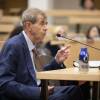In a push to further democratize Boston's budget process, Mayor Michelle Wu is launching a series of "community listening sessions" aimed at giving residents more input into how resources are allocated across the city.
At a Thursday press conference, Wu said the sessions will let Bostonians shape the budget process during its earliest stages rather than offering input when the outcome is already close to a forgone conclusion. The first session is slated to take place on Tuesday.
"I served on the council for many years before stepping into this role [and] have been part of many, many budget conversations," Wu said in the English-language portion of her remarks, which she subsequently delivered in Spanish. "And it was always frustrating that by the time we got to the point in the process, late in spring, where residents could actually come, express their views, give feedback, many of the line items were already locked in."
In 2021, Boston's operating budget totaled $3.76 billion. That does not include separate funding for the city's public school system.
Wu also suggested that the four listening sessions — which will occur on Feb. 15, 19, 23, and 25 — represent a shift in how city government is conceptualized.
"As we strive to build a city that's more responsive to the needs of all of our communities, we will continue to look to our residents as leaders and critical partners in achieving those goals," Wu said.
The new initiative, which is a collaboration between Wu and the Boston City Council, comes as the city shifts to a new budgeting framework that diminishes the mayor's authority and gives the council more power to shape how money is spent. Boston voters overwhelmingly backed the change in November 2021, the same election in which Wu won a commanding victory over Annissa Essaibi George.
State Senator and Boston City Councilor Lydia Edwards, who led the push to revamp the budget process last year, was one of several councilors who spoke after Wu. She praised the mayor, her longtime political ally, for "being willing to hold up a mirror to the people, first, who are paying for us to function as a government."
"I think it's a moment of awesome vulnerability," Edwards added. "We're going to also find out where we maybe didn't meet the mark. But more importantly, we're setting a table for the people of Boston to tell us first."
More information on the listening sessions and Boston's new budget process is available at Boston.gov/budget.








